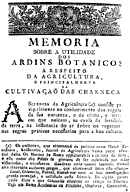|
Domingos Vandelli (1735-1816)
 |
|
|
|
Domenico Agostino Vandelli was born in Pádua, Italy. His father, G. Vandelli, was a Professor at the University of Pádua and a doctor in Medicine. He graduated in Philosophy from the University of Pádua and was invited by the Marquis of Pombal (1699-1782), within the framework of the reform of the University of Coimbra, to come to Portugal to occupy a position at the Faculty of Philosophy. He is believed to have arrived in Portugal around 1765. At the Faculty of Philosophy he was nominated lector of Chemistry and Natural History. He was also responsible for selecting the location for the establishment of the Botanical Gardens, the Laboratório Químico and the Museu de História Natural of the University of Coimbra.
In around 1780, he presented the University with a project for the establishment of a chinaware factory in Rossio de Santa Clara in Coimbra. This factory became famous for the quality of its chinaware, which became known as “Vandelles chinaware”. Vandelli was granted the exclusive privilege of the chinaware produced.
In 1787, he went to live in Lisbon, where he became the first director of the Botanical Gardens of Ajuda, being nominated Deputy of the 'Real Junta do Comércio, Agricultura, Fábricas e Navegação destes Reinos e seus Domínios'. He continued to be director of the Laboratório Químico of the University until 1791, despite being away from Coimbra.
During the French invasions, between 1807 and 1811, he was accused of being Frenchified and in 1810, at the age of 80, he was arrested and deported to the Ilha Terceira, in Azores, together with other suspects, in what became known as the Setembrisada. He was later authorised to go to England, from where he returned in 1813.
He died in Lisbon in 1816.
Scientific Activity
He was a member of several scientific academies, namely the Academia Real das Ciências de Lisboa, where he presented several memoirs related to Agriculture, Industry and Economics. He exchanged correspondence with several foreign scientists, the most famous being Carl Lineu (1707-1778).
He drew up the plans for the Botanical Gardens of the University of Coimbra, in conjunction with João António Dalla-Bella (1726-c.1823), an Italian physicist who, like Vandelli, was invited to join the Faculty of Philosophy of the University of Coimbra. In Coimbra, he concerned himself mostly with the Museu de História Natural and the Botanical Gardens, always delegating to second place his activity at the Laboratório Químico, of which he was director. In this laboratory he was successively replaced in his permanent duties by Manuel Joaquim Henriques de Paiva (1752-1829), Constantino António Botelho de Lacerda Lobo (1754-1820), Tomé Rodrigues Sobral (1759-1829) and Vicente Coelho Seabra (1764-1804), until he abandoned the position in 1791, with Tomé Rodrigues Sobral taking his place as director.
In Lisbon he organised and enriched the Botanical Gardens of the Palácio da Ajuda.
Publications
Most of Vandelli’s scientific production concerns Natural History and Botany, more specifically.a. Dissertatio de arbore Draconis, seu Dracoena. Accessit disserta tio de studio Historioe Naturalis necessario in Medicina, Economia, Agricultura, Artibus et Commercio. Olissipone, apud. Ant. Rod. Galliardum 1768.
Fasciculus Plantarum cum novis generibus et speciebus. Ibi, ex Typ. Regia 1771.
Memoria sobre a utilidade dos Jardins Botanicos. Lisboa, na Regia Offic. Typ. 1770.
Diccionario dos termos technicos de Historia Natural, extrahidos das obras de Linnêo, com sua explicação e estampas abertas em cobre, para facilitar a intelligencia dos mesmos, Coimbra, na R. Of fic. da Univ. 1788.
Memoria sobre a utilidade dos Jardins Botanicos. Coimbra, na R. Of fic. da Univ. 1788.
Viridarium Grisley Lusitanicum, Linnareanis nominibus illustratum. Jussu Academi" in lucem editum. Olisipone, ex Typ. Reg. Acad. Scient. Olisip. 1789.
Florae Lusitanicae et Brasiliensis Specimen. Et Epistoloe ab eruditis viris Carolo a Linné, Antonio de Haen ad Dom. Vandelli script". Conimbricae, ex Typ. Academico Regia, 1788.
Nas Memórias da Academia das Ciências de Lisboa:
"
De Vulcano Olisiponensi et montis Erminii" Lisboa, 1797. tomo I.
"
Memoria sobre a ferrugem das oliveiras", tomo I.
"
Memoria sobre a agricultura deste reino e das conquistas", Tomo I.
"
Memoria sobre algumas producções naturaes deste reino",Tomo I.
"
Memoria sobre algumas producções naturaes das conquistas", Tomo I.
"
Memoria sobre as produccões naturaes do reino e das conquistas, primeiras material de differentes fabricas e manufacturas", Tomo I.
"
Memoria sobre a preferencia que em Portugal se deve dar á agricultura sobre as fabricas", Tomo I.
"
Memoria sobre varias misturas de materias vegetaes na factura dos chapéos", Tomo II.
"
Memoria sobre o modo de aproveitar o carvão de pedra e paus bituminosos",Tomo II.
"
Memoria sobre o encanamento do rio Mondego", Tomo III.
"
Memoria sobre as Aguas livres", Tomo III.
"
Memoria sobre o sal gemma das ilhas de Cabo Verde", Tomo IV.
Fernando Reis
Bibliography
COSTA, A. M. Amorim da, Primórdios da Ciência Química em Portugal, Lisboa, ICLP, 1984.
COSTA; A. Amorim da, "Domingos Vandelli (1730-1816) e a Cerâmica Portuguesa", in Publicações do Centenário da Academia das Ciências de Lisboa, 2, 1986, pp. 353-372.
SILVA, Inocencio da, ARANHA, Brito, Diccionario Bibliographico Portuguez, Lisboa, Imprensa Nacional, pp. 200-202.
|
|